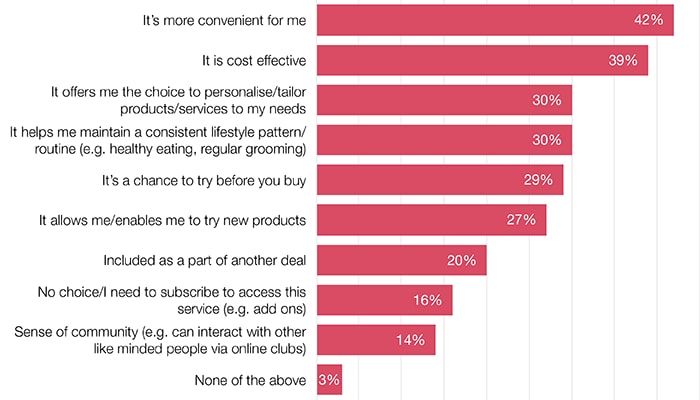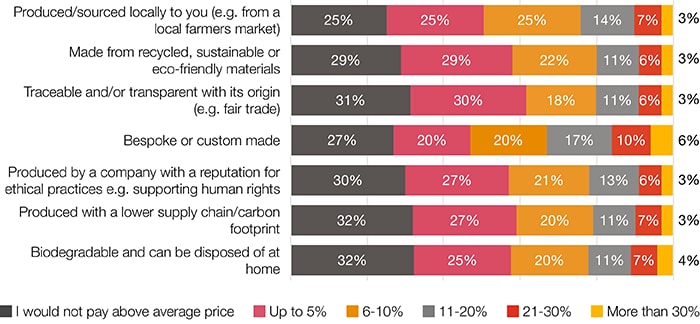
In a world where it’s hard to get more out of existing consumer spending, converting or finding new customers takes on a new urgency. By focusing more on shopping purchase decision processes, businesses can get closer to their customers and foster both paid and earned loyalty. In doing so, they can also contribute to a more efficient, responsible and profitable marketplace.
The theme of the previous Consumer Insights Pulse Survey, published in February 2023, was removing friction at the point of sale or in the purchase experience. Our July edition speaks directly to removing friction before the purchase experience and offers a roadmap to reach consumers at crucial decision points.
What follows will amplify the consumer’s voice in areas that have long been important but are evolving against a backdrop of heightened pressure and innovation. They include: how to leverage technology such as generative artificial intelligence (AI) and chatbots; where to invest in customer relationship management (CRM), mobile apps and social media; where to build out direct-to-consumer (D2C) and subscription capabilities; how to meet customers where they are on environmental, social and governance (ESG) and sustainability issues; and where to capture growth in consumer spending in the coming months.
Decision point: where do consumers look for information?
In our latest consumer survey, consumers reported beginning their pre-purchasing activities by scouring the internet to gather information about a particular product or service, compare prices, read reviews and consider retailers. This was the first time consumers were asked to identify their research preferences. Similar to global counterparts, 26% of Irish consumers ranked search engines as the top source of pre-purchase information. E-commerce aggregator Amazon and individual retailers’ websites came in at 14% each.
Mobile phones/smartphones are popular assistants in making purchasing decisions. For example, 48% of Irish consumers said that they almost always or frequently use their mobile devices/ smartphones to research a product online before making a purchasing decision. 27% use their mobile phones/smartphones to access retailer apps to research products, and 24% use their mobile phones/smartphones in-store to compare products.
Marketers and retailers continue to expand their use of social media, which has important implications for the decision-making process. When asked what types of ads influence pre-purchase decisions, 29% of respondents say they prefer ads that link directly to offers and promotions for their favourite brand or product. 31% are attracted by sponsored ads on social media and, in a signal that the demise of traditional TV may be greatly exaggerated, 42% say the medium still influences their decisions. Not surprisingly, 54% of the TV-watching cohort are baby boomers. This indicates potential ad growth on streaming platforms targeted at these audiences as they further embrace digital media (see chart below).
Direct promotional links and sponsored social media ads remain in strong competition with tv advertising for influencing purchase
Question: Which types of advertisements do you find most influential in making a purchase decision?

Base: All respondents (511)
Source: PwC’s June 2023 Global Consumer Insights Pulse Survey
The metaverse promises to deliver the ultimate in frictionless shopping technology, though that immersive virtual world in which your avatar does the work is still unfolding in complexity and usage. Although usage of the metaverse is hovering at around 5% in Ireland, awareness and interaction are growing. For example, 7% of Irish consumers have used a virtual reality (VR) headset to play games, up from 4% six months ago. An additional 37% of respondents are at least familiar with the metaverse, though they’ve never used it.
Consumers show a willingness to adopt generative AI
By leveraging generative AI, e-commerce retailers can revolutionise how consumers explore, evaluate and ultimately decide on their purchases. Notably, 77% of Irish consumers are interested in using a chatbot during their purchasing activities. In particular, 32% of Irish consumers said they would be interested in using chatbots to search for product information before they make purchase decisions. Considering today’s exponential growth in generative AI platforms, this game-changing tool is widely anticipated to grow.
Looking ahead, there is appetite to use chatbots across a variety of activities, from pre-purchase information to customer support and notifications
Questions: Recently there have been major increases in the capabilities of what chatbots can do. Which, if any, of the following functions of a chatbot would you be interested in using?

Base: All respondents (511)
Source: PwC’s June 2023 Global Consumer Insights Pulse Survey
Take action on search and tech
Evolve your search engine optimisation (SEO) strategy beyond a keyword strategy. High-quality, relevant and unique content helps you get noticed by search aggregators and deliver targeted messaging directly to consumers.
Increase investment in AI applications to optimise assortment, pricing and supply chain, among other functions. Establish clear leadership through a distinct stakeholder, such as the chief data officer (CDO), to allow for consistency and scalability from the outset.
Adopt a ‘launch and learn’ approach to generative AI, including virtual try-on and visualisation, intelligent product recommendations, chatbots and virtual assistants, user-generated content analysis, and pricing strategy optimisation.
Decision point: whom do consumers want to buy from?
Irish consumers display increased interest in purchasing directly from brands
One salient finding from the survey is that consumers are increasingly eschewing traditional intermediaries and marketplaces to buy directly from brands.
According to the survey, Irish consumers are increasingly bypassing traditional retailers. 73% report that they have purchased products directly from a brand’s website and we expect that number to grow. An additional 21% say that although they haven’t done so yet, they are considering this option.
The most popular shopping categories where Irish consumers would consider purchasing directly from a brand’s website are home furnishings (58%), beauty (51%) and electronics (48%). The key reasons are the product’s authenticity (21%) and more competitive pricing (23%).
Firms should capitalise on D2C trends. With the right marketing tools and technologies, they can connect more often with the end consumer, bypassing their retail partners. Indeed, those who can maintain sophisticated e-commerce channels and optimise digital marketing technology have increased control over the customer experience, access to valuable customer data and insights, and improved profit margins and revenue opportunities.
Subscription services: a shift from growth engine to contested decision point
The decision to subscribe is, in effect, a decision to purchase a given product or service over a fixed period. The subscription economy—for items as varied as meal kits and beauty products—grew by more than 300% globally from 2012 to 2019. Key reasons given by Irish consumers for using subscription services are convenience (42%) and cost-effectiveness (39%).
38% of Irish consumers are interested in using a subscription service to purchase products/services, compared to 56% of their global counterparts.
However, the level of purchasing on subscriptions is relatively low. For example, 13% of Irish consumers purchase clothing or fashion on subscription. However, 47% of Irish consumers cancelled their subscription service because it was too expensive.
The subscription boom appears to be waning
Reasons to subscribe
Question: Why do you use or plan to use product/service subscriptions?

Reasons to cancel
Question: You have indicated that you have cancelled a subscription in the past. Which of the following best describes your reason(s) for deciding to cancel?

Base: All respondents (511)
Source: PwC’s June 2023 Global Consumer Insights Pulse Survey
Take action on D2C and subscriptions
Prioritise a customer experience that is frictionless and omnichannel, ensuring consistency across your CRM tools. This should extend to messaging and product information across your D2C website, mobile app, social media platforms and physical stores.
Consider your subscription offering in light of consumers’ spending habits in the post-pandemic era (e.g. they are focusing on buying fewer discretionary items and looking for lower prices).
Decision point: what are consumers willing to pay for sustainability?
Consumers have made up their minds about sustainability and are willing to pay a premium for it. In our February 2023 survey, around 70% of Irish respondents said they would pay more for sustainably produced goods. This is a positive trend. Consumers benefit from aligning their social concerns with purchasing practices; companies, for their part, may get some much-needed pricing power.
Our June survey delved deeper, asking consumers how much above the average price they’d pay for various goods, such as locally produced food at a farmers’ market, products manufactured with a lower carbon footprint and custom-made or bespoke items. On average, one in two Irish consumers would be willing to pay up to 10% above the average price for products produced sustainably/ethically. Millennials and Gen Z, who typically espouse social consciousness and environmental justice, were the most open to spending more for sustainability.
Consumers will pay a sustainability premium of 5% or more
Question: How much above an average price would you be willing to pay for a product that is…

Base: All respondents (511)
Source: PwC’s June 2023 Global Consumer Insights Pulse Survey
Reducing returns
Another important decision point comes after the purchase. Returns have always been a fact of shopping life. With the evolution of e-commerce, however, returns have become a trickier issue for e-tailers than for brick-and-mortar retailers, mostly due to fluctuating shipping costs and logistics. The unexpected surge in online shopping during the pandemic only exacerbated the situation.
We posed a new question regarding e-tailers’ return policies, specifically about what factors would reduce the number of returns consumers make. Providing more accurate sizing information ranks on top for 49% of respondents, and 35% chose greater accuracy in product descriptions. 37% of those polled say reading other customers’ reviews would reduce the number of returns they make. Interestingly, 13% of online shoppers don’t typically return items.
Factoring influencing a reduction in online returns
Question: Which of the following factors, if any, would reduce the number of returns you make?

Base: All respondents (511)
Source: PwC’s June 2023 Global Consumer Insights Pulse Survey
Take action on sustainability
Conduct product life cycle cost analysis to optimise your pricing strategy for sustainable goods.
Effectively communicate the sustainability benefits of products through credible reporting that emphasises the long-term benefits and value proposition of sustainable choices.
Decision point: what are consumers’ future intentions?
The future: online spending set to surge despite challenging personal financial situation
Although the digital landscape is in flux amid high costs, increased competition and a decline in certain discretionary spending, 36% of Irish consumers intend to increase online spending over the next six months. This is a significant jump from the 27% recorded in the previous survey.
At the same time, 28% of Irish respondents expect to increase shopping in physical stores, up from 23% six months ago.
Consumer spending, however, will remain cautious in the coming months. 45% of Irish consumers surveyed expect to reduce spending on fashion over the next six months compared to the previous six months. Around a third expect spending reductions in consumer electronics (38%), home entertainment (36%) and health and beauty (34%). Around four in ten expect to reduce spending on luxury goods over the next six months.
With food inflation persisting, 46% of Irish consumers expect to increase their spending on groceries over the next six months.
Take action to capture future spend
Provide comprehensive and accurate product information to help consumers make informed decisions by leveraging technologies such as augmented reality (AR) or virtual reality (VR) to offer virtual product experiences.
Utilise customer data and advanced analytics to deliver personalised product recommendations. Personalisation based on customer preferences, purchase history and browsing behaviour enhances the shopping experience, increases relevance and encourages future spending.
Through effective strategies, companies operating in consumer markets can influence the critical decision points where customers make crucial choices. Capabilities such as optimised search engine optimisation, together with investment in next-generation technology to deepen access to information, can capture customers’ attention and drive sales. By understanding and capitalising on these opportunities, companies can successfully intervene at key decision points and guide customers towards choosing their products or services.
We are here to help you
Our pulse survey offers insights into the complexity of changing expectations and increasing demands among Irish consumers. There is a broad range of issues to address, and careful consideration is required to ensure that decisions align with the long-term strategy. Our team of industry and subject matter experts are available to discuss any questions you may have. Contact us today.










Menu